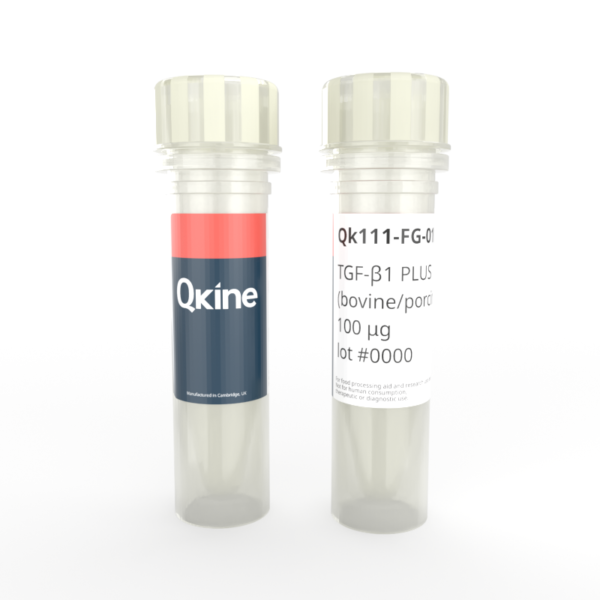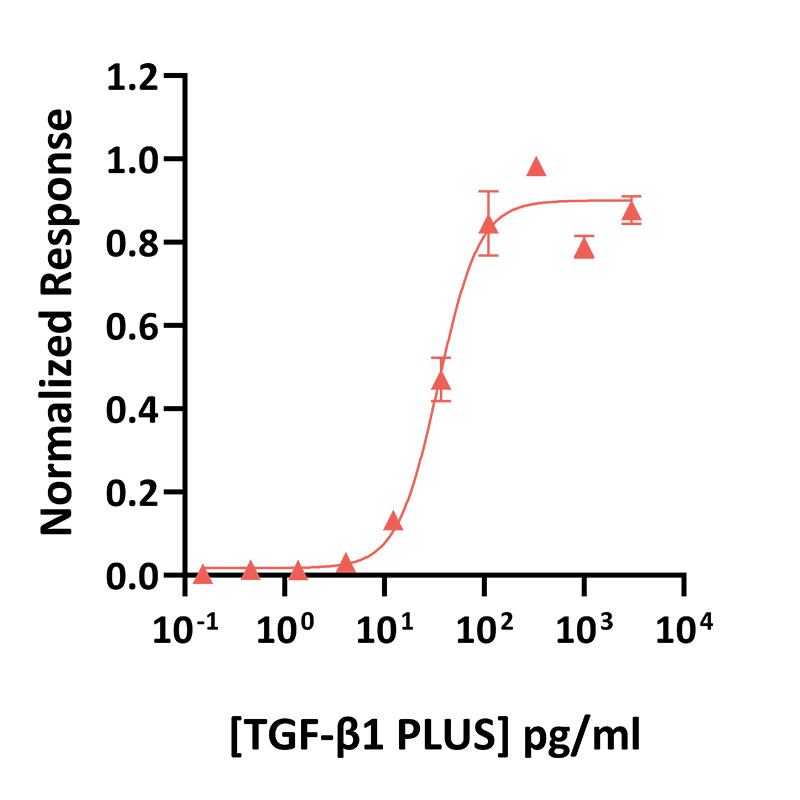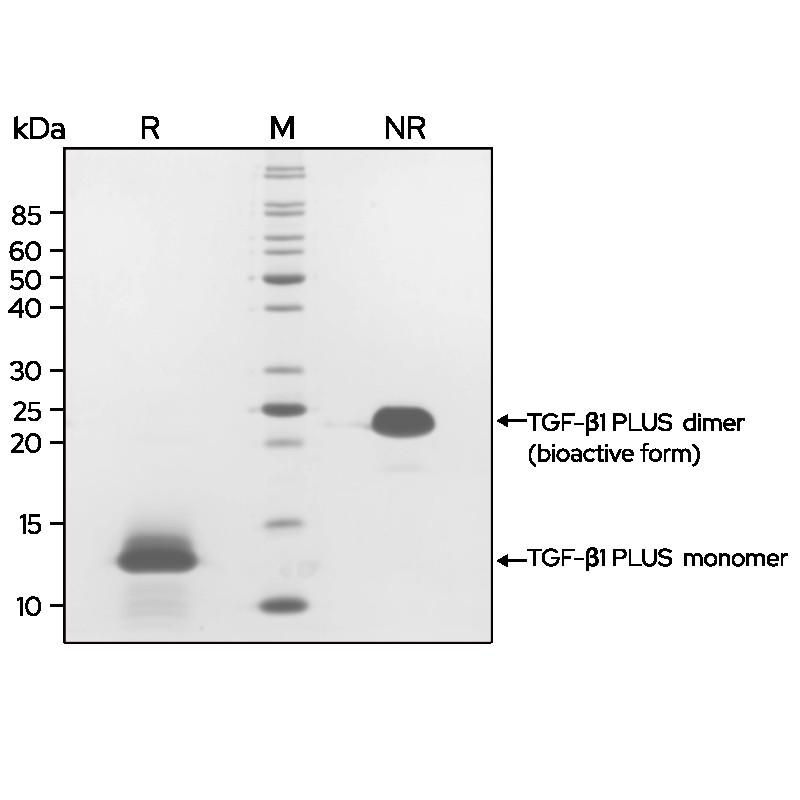 Recombinant bovine/porcine TGF-β1 PLUS™ protein (Qk111-FG)
Recombinant bovine/porcine TGF-β1 PLUS™ protein (Qk111-FG)Recombinant bovine/porcine TGF-β1 PLUS™ protein (Qk111-FG)
£255.00 – £3,600.00

Transforming growth factor-beta 1 (TGF-β1) is an essential growth factor in many embryonic and induced pluripotent stem cell maintenance media, including the commonly used E8, StemPro, and mTeSR media. TGF-β1 also promotes the differentiation of various cell types such as fibroblasts, epithelial cells, and immune cells.
High quality food grade bovine/porcine recombinant TGF-β1 PLUS™ protein is the first entirely animal origin-free recombinant TGF-β1 protein for highly reproducible results and compatible with chemically-defined stem cell media and cultivated meat applications.
TGF-β1 PLUS™ is a high purity 24 kDa dimer comprising optimized mature domain of TGF-β1 protein.
In stock
Orders are typically shipped same or next day (except Friday).
Easy world-wide ordering, direct or through our distributors.
£255.00 – £3,600.00
Fast and free shipping.
Buy online with secure credit card or purchase order. For any questions, please email orders@qkine.com
Summary:
- High purity optimized bovine/porcine TGF-β1 protein (Uniprot: P18341)
- 24 kDa (dimer)
High quality food grade recombinant protein
>98%, by SDS-PAGE quantitative densitometry
Expressed in E. coli
Animal origin-free (AOF) and carrier protein-free
Manufactured in the UK under a food manufacturing HACCP regime
Lyophilized from acetonitrile, TFA
- Resuspend in 10 mM HCl (Reconstitution solution A) at >50 µg/ml, add carrier protein if desired, prepare single-use aliquots and store frozen at -20 °C (short-term) or -80 °C (long-term)
Featured applications:
Bovine and porcine stem cell expansion and maintenance
Cellular agriculture and cultivated meat cell culture media optimization
Serum-free media development

TGF-β1 PLUS activity was determined using the firefly luciferase reporter assay in transiently transfected HEK293T cells. Cells were treated in triplicate with a serial dilution of TGF-β1 PLUS. Firefly luciferase activity was measured and normalized. EC50 = 34.8 pg/ml. Data from Qk010 lot #011.
TGF-β1 PLUS™ dimer migrates as a single band at 24 kDa in non-reducing (NR) and 13 kDa as a single monomeric species upon reduction (R). High purity yield of dimeric protein (bioactive form). Purified recombinant protein (7 μg) was resolved using 15% w/v SDS-PAGE in reduced (+β-mercaptoethanol, R) and non-reduced conditions (NR) and stained with Coomassie Brilliant Blue R250. Data from Qk010 lot #012.

Further quality assays
Mass spectrometry: single species with expected mass
Recovery from stock vial: >95%
Endotoxin: <0.005 EU/μg protein (below level of detection)
Full raw materials traceability, allergen analysis, CoO, CoA, beta-lactam-free and animal origin-free certification available
We are a company founded and run by scientists to provide a service and support innovation in stem cell biology and regenerative medicine. All our products are exceptionally high purity, with complete characterisation and bioactivity analysis on every lot.
Protein background
Transforming growth factor-beta 1 (TGF-β1) is a pleiotropic cytokine part of the TGF-β superfamily. TGF-β1 regulates various cellular processes, including cell proliferation, growth, differentiation, motility, and apoptosis [1]. It plays a crucial role in the immune response, tissue repair, and the epithelial-mesenchymal transition. Transforming growth factor-beta 1 is produced by various cell types, including immune cells, fibroblasts, and epithelial cells. It is synthesized and secreted as an inactive or latent complex, associated with latency-associated proteins (LAP), and targeted to the extracellular matrix [2]. It is released from latency by TGF-β activators including plasmin, matrix metalloproteases and integrins. Once the LAP cleaved, the mature transforming growth factor-beta 1 is a homodimeric protein composed of two identical subunits linked by a disulfide bond. Its amino acid sequence is composed of 390 amino acids. TGF-β1 signals through complexes of cell surface receptors including TGF-βRII/TGF-βRI and ALK-5/ALK-1. This triggers downstream signaling cascades, such as the Smad-dependent and Smad-independent pathways.
In cell culture, recombinant TGF-β1 protein is an essential growth factor in many embryonic and induced pluripotent stem cell maintenance media, including the commonly used chemically-defined E8, StemPro, and mTeSR medias [3–5]. Transforming growth factor-beta 1 supports the survival and maintenance of pluripotency of stem cells [1]. TGF-β1 is used to promote the differentiation of various cell types such as fibroblasts, epithelial cells, and immune cells. It is used in combination with other growth factors such as BMP-2 to regulate bone marrow stromal cell differentiation or with IL-2 and IL-6 to regulate T reg and Th17 cells differentiation [6–8].
To date, recombinant human TGF-β1 has only been produced from mammalian cell protein expression systems (HEK or CHO), where endogenous protein contaminants, cost and animal-free status is a challenge. As part of the ongoing mission to redefine industry standards for growth factor and cytokine biochemical quality, Qkine introduced the first optimized, animal origin-free, and highly bioactive recombinant human TGF-β1.
Benefits:
- Truly animal-free alternative for chemically-defined stem cell culture media
High potency in iPSC culture with high pluripotency (nanog) marker expression
High purity, extensive biochemical data, and exceptional batch-to-batch consistency
FAQ
TGF-β1 is a multifunctional cytokine that plays a crucial role in various cellular processes. It regulates cell growth, differentiation, proliferation, migration, and apoptosis. It is also involved in the immune response, epithelial-mesenchymal transition, and the extracellular matric synthesis and modelling.
It is a member of the transforming growth factor-beta superfamily of cytokines that are synthesized as latent complexes. TGF-β1 requires further processing to become the biologically active, mature TGF-β1.
Dysregulation of TGF-β1 signaling is associated with various diseases such as cancer, fibrosis, autoimmune, cardiovascular, neurological, and chronic kidney diseases.
TGF-β1 is synthesized and secreted in an inactive or latent form. It is activated through cleavage and binding to matrix metalloproteinases, integrins, extracellular matrix such as thrombospondin-1, but also pH changes and reactive oxygen species.
It is an essential growth factor in many embryonic and induced pluripotent stem cell maintenance media, including the commonly used E8, StemPro, and mTeSR media. TGF-β1 also promotes the differentiation of various cell types such as fibroblasts, epithelial cells, and immune cells.
Qkine TGF-β1 PLUS™ protein is the first entirely animal origin-free recombinant TGF-β1 protein, TGF-β family members are difficult to express in E. coli due to their complex folding so are only commercially available expressed in animal cells. Qkine have optimized the production of TGF-β1 to produce a pure animal origin-free protein or highly reproducible results and compatible with chemically-defined stem cell media.
Our products are for research use only and not for diagnostic or therapeutic use. Products are not for resale.

Receive an Amazon gift voucher when you leave us a review.
£25, $30 or €30 for reviews with an image and £10, $15 or €15 for reviews without an image